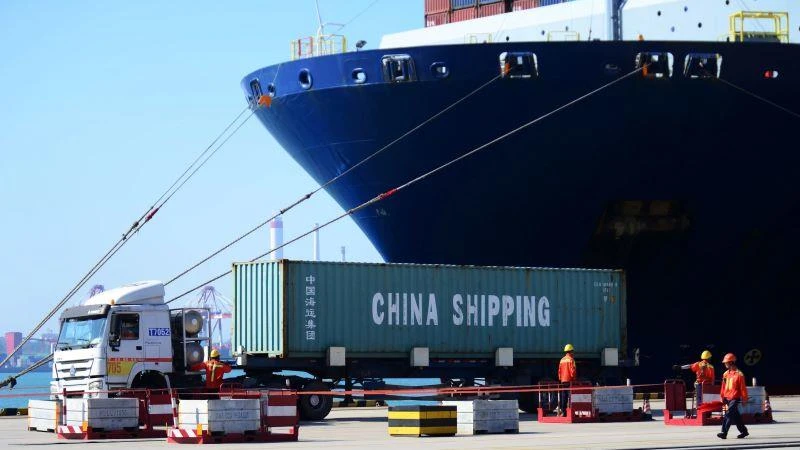
The outlook for major Asian economies has once again been revised downward, due to the negative influence of the U.S.-China trade war, which has caused exports to fall across the region. The 2019 growth forecast for the five Association of Southeast Asian Nations members was 4.3%, marking the fourth consecutive downward revision since a survey in September 2018.
The Indian economy is still likely to maintain growth of nearly 7%, but that projection is lower than it was. Recognizing the U.S.-China tensions as the biggest risk for their economies, Asian economists believe that the uncertainty will continue, a survey found.
The Japan Center for Economic Research and Nikkei conducted a quarterly consensus survey from June 7 to 28, gaining responses from 43 economists and analysts in five of the biggest members of ASEAN -- Indonesia, Malaysia, the Philippines, Singapore and Thailand -- as well as India.
The weighted average of growth forecasts for the ASEAN5 in 2019 was 4.3%, revised down by 0.3 points from the previous survey in March -- the fourth consecutive downward revision since September 2018. The figure was 5.0% in the June 2018 survey. The latest figure of 4.3% is 0.5 points lower than the 4.8% achieved in 2018.
The outlook was downgraded in all five countries, but the drops were most notable in export-oriented Thailand and Singapore. "Similar to other exporting countries, Thailand is likely to suffer from the global economic slowdown and trade war this year," said Panundorn Aruneeniramarn of Thailand's Siam Commercial Bank Economic Intelligence Center.

"The drag on growth is expected to continue until the trade outlook clears," echoed Randolph Tan of Singapore University of Social Sciences. On the Malaysian economy, which also depends heavily on exports, Wan Suhaimie of Kenanga Investment Bank saw that "downside risks to growth remain" because of "amplified global uncertainties largely from the protracted U.S.-China negotiations."
The Indonesian and Philippine economies are expected to keep high growth rates of 5% and 6%, respectively, but the 2019 forecasts were revised downward. "Economic growth is challenged by the trade war between U.S. and China" as it would decrease commodity prices as well as export opportunities, remarked Dendi Ramdani of Bank Mandiri Indonesia.
The Philippine economy temporarily slowed down in the January-March period due partly to a delay in its budget being approved, but Alvin Ang of Ateneo de Manila University predicted a recovery. The passage of the delayed budget and consequent increase in public expenditure would put the growth "back on track," he said. Still, he cautioned that "exports [will] weaken further" if the U.S.-China trade war escalates.
India's growth projection for 2019/20 was 6.9%, revised down 0.2 points from the previous survey. It was just 0.1 point higher than the 6.8% growth achieved in 2018/19. The growth rate in January-March in 2019 reached a five-year low of 5.8% due to various reasons including the slowing world economy, uncertainty in politics and weaker rural consumption.
The political uncertainty has now subsided following the landslide victory of Prime Minister Narendra Modi's party in the general election which completed in May.

The central bank in early June lowered the policy rate by 0.25 points to 5.75%, the third rate cut in 2019. Sonal Varma of Nomura India projected a recovery after the summer "due to the lagged effects of easier monetary policy." Still, she was cautious about downside risks "from a weak shadow banking sector."
The survey asked economists about the effects, both already realized and still emerging, of the U.S.-China tensions. A slowdown in exports, especially those headed to China, was given in many of the responses from ASEAN countries. A trend of relocating production sites from China to other Asian countries was notable.
The survey responses also indicated the difference between nations in terms of the impact from the trade war. A decrease in the price of palm oil and other commodities was affecting the Indonesia economy, while India was an increase in its exports to China.
U.S. President Donald Trump and Chinese President Xi Jinping met in Osaka, Japan, in late June and agreed to reopen trade talks, but the future development of their relations remains unclear. Manu Bhaskaran of Centennial Asia in Singapore commented that "it will take time for trade restrictions to ease" even if the talks resume.
Some economists expressed their concerns over further escalation of the tensions. Amonthep Chawla of CIMB Thai Bank said: "I would be more worried if the trade war escalates to a currency war or tech war." Such a situation could "force Thai investors to take sides either with the U.S. or China," he added.

Dharmakirti Joshi of CRISIL in India said: "The U.S.-China trade tensions have given rise to a new set of challenges as well as opportunities for the Indian economy." In a rapidly changing global economic environment, "the ability of the government to handle the challenges to the economy will be tested," remarked Randolph Tan of Singapore University of Social Sciences.
As for the risks that economists have recognized, "a slowdown or decrease in trade triggered by U.S.-China tensions surrounding trade and/or high tech issues" was the largest risk cited in all six countries. A sense of the risk to political instability generally diminished in the region. It was the biggest risk in India in the March survey, but no economist considered this risk in the June survey.
More details of the survey, including a full list of respondents, can be found on the JCER's website.




















